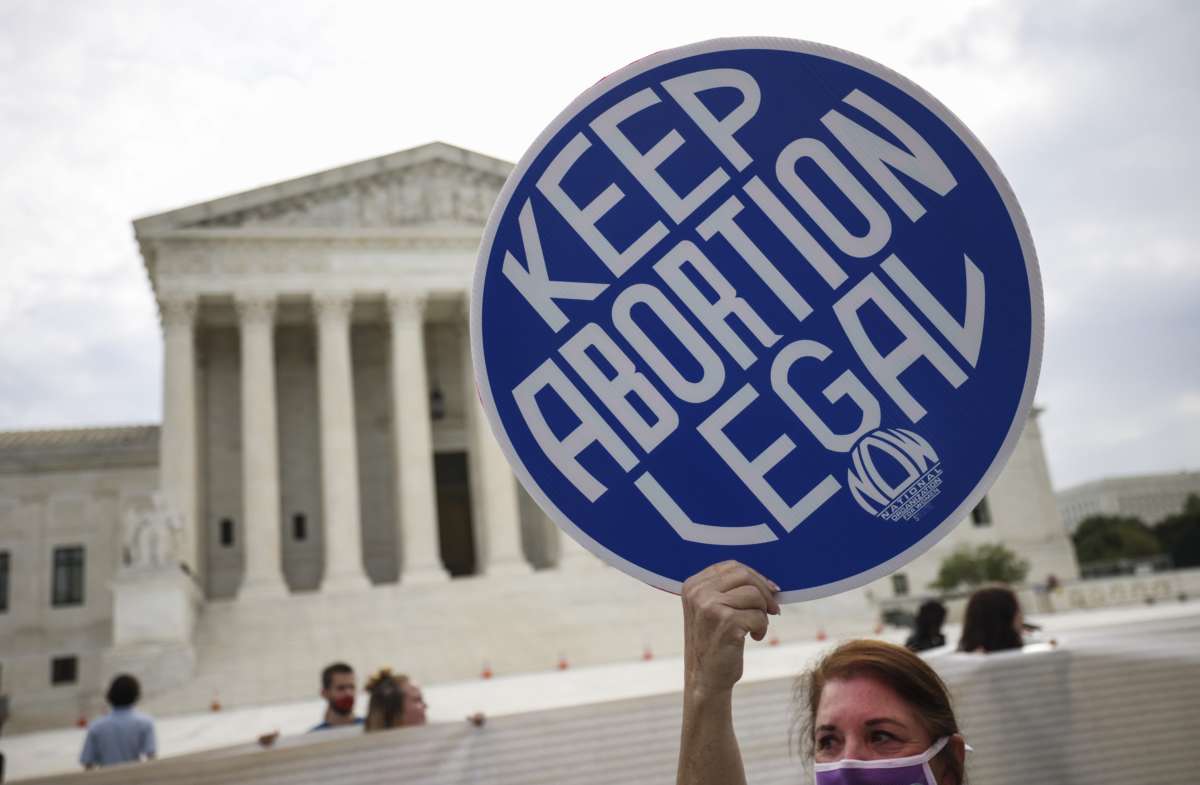On Friday, the Biden administration announced that it planned to appeal to the Supreme Court an order from a lower court issued last week, which kept in place a restrictive Texas law that outlaws abortion after the sixth week of pregnancy.
A three-judge panel in the United States Court of Appeals for the Fifth Circuit lifted a previous injunction from a federal district court judge that had blocked the law’s enforcement. The U.S. Department of Justice (DOJ) then sought to have that panel place a temporary stay on its own ruling until formal arguments against the law could be heard, which it refused to do on Thursday.
In response, the DOJ said it would appeal the Fifth Circuit Court’s refusal to place a stay on the law, also known as Senate Bill 8, directly to the Supreme Court — but it didn’t state specifically when it would make such an appeal.
“The Justice Department intends to ask the Supreme Court to vacate the 5th Circuit’s stay of the preliminary injunction against Texas Senate Bill 8,” a statement from DOJ spokesperson Anthony Coley said.
The Texas law bars all abortions after six weeks of pregnancy — so early on in the pregnancy that many people don’t yet realize they are pregnant — and contains no exceptions for rape or incest. Rather than having the state enforce the law, private citizens are incentivized to sue people they believe helped someone procure an abortion, including abortion providers themselves. Petitioners are allowed to sue for sums of up to $10,000.
The DOJ has previously asserted its standing and ability to sue in order to block the Texas law, claiming it had a vested interest in upholding national standards on abortion access that have been established for decades.
“The United States has the authority to seek redress from this Court against the State of Texas, particularly in light of the procedural obstacles that Texas erected to shield S.B. 8 from judicial scrutiny in suits by directly affected persons,” the DOJ wrote in a federal court filing in mid-September.
According to Jessica Levinson, a professor at Loyola Law School, the possibility that the DOJ could convince the Supreme Court to agree to a stay on the law’s execution is improbable, due to an order from the court in September that announced it wouldn’t intervene in the matter.
“It’s an incredible longshot that the Supreme Court would say, no, we’re going to push pause on this Texas law,” Levinson said in an interview with NPR last week.
Texas asserts that it cannot be sued over the law because the state is not responsible for its enforcement — an argument that was endorsed by the conservative majority of the Supreme Court, who refused to place an injunction on the law.
Justice Sonia Sotomayor dissented with the order, calling the directive from the court “stunning.”
“Presented with an application to enjoin a flagrantly unconstitutional law engineered to prohibit women from exercising their constitutional rights and evade judicial scrutiny, a majority of Justices have opted to bury their heads in the sand,” she said.
Note: A correction has been made to clarify that the previous injunction was made by a federal district court judge.
Our most important fundraising appeal of the year
December is the most critical time of year for Truthout, because our nonprofit news is funded almost entirely by individual donations from readers like you. So before you navigate away, we ask that you take just a second to support Truthout with a tax-deductible donation.
This year is a little different. We are up against a far-reaching, wide-scale attack on press freedom coming from the Trump administration. 2025 was a year of frightening censorship, news industry corporate consolidation, and worsening financial conditions for progressive nonprofits across the board.
We can only resist Trump’s agenda by cultivating a strong base of support. The right-wing mediasphere is funded comfortably by billionaire owners and venture capitalist philanthropists. At Truthout, we have you.
We’ve set an ambitious target for our year-end campaign — a goal of $119,000 to keep up our fight against authoritarianism in 2026. Please take a meaningful action in this fight: make a one-time or monthly donation to Truthout before December 31. If you have the means, please dig deep.
